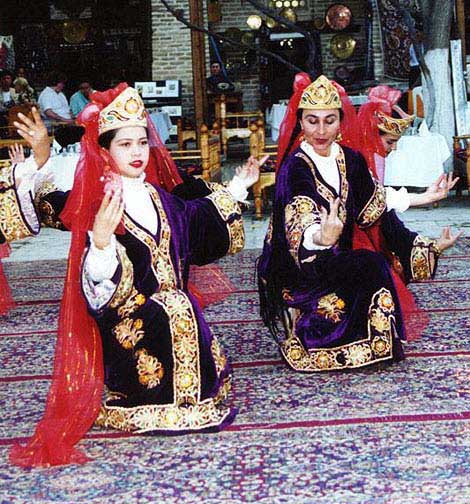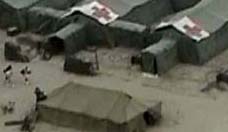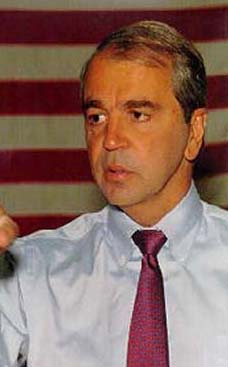
"I was the first American many people there had ever seen, and maybe would ever see. They stared at me when I walked to the school where I taught, almost as though I were naked. I am tall compared with Uzbek woman, and I don’t have gold teeth as many do. I wear what must have seemed like funny clothes and shoes. Oddest of all, I am not married, and have no children. I hoped that after a while, I wouldn’t be such a spectacle. But my early departure from Uzbekistan foiled that hope."
The experiences of Jessica Teicher as a Peace Corps volunteer in Uzbekistan : Part II: Khorezm: “Where the Weather is Hot, But the Water is Not”
UZBEKISTAN NOTEBOOK: THE EXPERIENCES OF A PEACE CORPS VOLUNTEER
Jessica Teicher 8/10/05
Part II: Khorezm: “Where the Weather is Hot, But the Water is Not”
Print this article Email this article
I was assigned to Khorezm, in the western part of Uzbekistan, where the climate is hot, dry and dusty. My host family during Peace Corps training in Tashkent was worried about me, because Khorezm is known throughout Uzbekistan for its salty drinking water. During our training, we were told to make up a catch phrase for our regions, and we expressed this common sentiment: "Khorezm: where the weather is hot, but the water is not."
I studied the Uzbek language intensively during my three months in Tashkent. But in Khorezm, I found that people spoke a more Turkish-sounding dialect. Social customs were different, too.
One new Uzbek word that made life easier was "oling," or "take just once." In Tashkent, whenever I was eating and had an empty spoon in my hand, my host would say "oling." As a guest, one must eat and drink with relish to show respect for one’s host. I felt annoyed with this pressure, and "oling" was a polite, sincere way to appreciate a host’s generosity.
My new Khorezm family was warm and welcoming. There is an Uzbek proverb, "treat your guest better than your father," and I experienced this both in Tashkent and Khorezm. I can never forget how my host families willingly offered me everything they could to make me comfortable.
I had imagined going to a clay shack in the desert, where my host family would force-feed me oily slabs of meat washed down with turpentine vodka. But instead, their large, two-level house was quite comfortable. We had electricity most of the time, although running water was scarce, and sinks were located outside the house.
Although I had a moment of disappointment, since I thought a Peace Corps volunteer should brave harsher conditions, I confess that I adapted myself to what were, for an Uzbek family, relatively high living standards.
The government controls water—and everything else—in Uzbekistan. If one person falls behind with water payments, the pump for an entire muhalah, or neighborhood, can be turned off until the whole bill is paid. I asked whether people who pay on time ever ask the government for their own water. My hosts replied that such a request would only anger the government, and could cause trouble. It was not a subject for further discussion.
The family consisted of a father, mother, mother-in-law, two daughters, and two sons. The parents owned a profitable cotton business, and had an apartment in Tashkent, where their elder daughter and son lived. Their daughter was a university student, and her brother worked for an international corporation. He was fluent in English, and spoke a few words with me during phone calls home, to make sure I was getting along well. Their teen-aged son and daughter still attended school in Khorezm.
I had my own room on the second floor of the house. One day, while I was searching through a cabinet for scissors and tape, I found a stash of English notebooks and folders. In one folder, there was an old 2002 newsletter from the Organization for Security and Cooperation in Europe (OSCE) discussing the impact of the Sept. 11 terrorist attacks on Central Asia. The newsletter described the efforts made by Central Asian governments to assist America with its "War on Terror."
I was eager to discuss this issue with the family’s son in Tashkent, but remembered my Peace Corps training. The American embassy had warned us volunteers to be careful in our phone conversations and e-mails. I had already disregarded this warning at times with frank e-mails about my frustration with the Uzbek government. So I never did mention the newsletter, and was forced to leave Uzbekistan together with my Peace Corps colleagues before I had a chance to meet my surrogate Tashkent brother in person.
But I am getting ahead of my story. We had been instructed to open a bank account where the Tashkent Peace Corps office could wire our monthly stipend, so we never had to wait for money by mail. Soon after I arrived in Khorezm, I tried to open a bank account and register with the regional superintendent of schools.
At the bank, the teller spoke a little English. When he asked for 1,000 sum--about one dollar--I offered to give more, since the Peace Corps had sent me to his bank with my whole first stipend in hand. The teller refused. I learned that in Uzbekistan, banks are not a wise place to keep money. Ten years ago, rapid inflation wiped out the savings of many Uzbeks. There is no such thing as deposit insurance in the country.
Later, just before I left the country, I got another banking lesson. The local banks were closed after police fired on protestors in the city of Andijan. I saw angry, shouting crowds of people try to get into a bank, but they were pushed back by police.
I was the first American many people there had ever seen, and maybe would ever see. They stared at me when I walked to the school where I taught, almost as though I were naked. I am tall compared with Uzbek woman, and I don’t have gold teeth as many do. I wear what must have seemed like funny clothes and shoes. Oddest of all, I am not married, and have no children. I hoped that after a while, I wouldn’t be such a spectacle. But my early departure from Uzbekistan foiled that hope.
My students were eager to learn, and were excited to meet and talk with a real, live American. We met in a temporary classroom where the army had once trained recruits, with diagrams of machine guns and a closet door punctured with bullet holes from what must have been target practice. Most of the other teachers really didn’t want to be at the school. They did not get a regular paycheck, and if they did, it was worth about $12 a month.
I had a counterpart, a full-time teacher who, unlike many of her colleagues, was enthusiastic and devoted to her work. I was to help her teach English in the local school.
Fortunately for me, she had spent some time at an educators’ training program in California, which the US State Department offered for teachers in post-Soviet states. Her background was unusual. She had divorced her husband, with whom she had a son. Divorce is not easy in Uzbekistan. Her mother-in-law had forced her to work in the fields as a cotton picker, and had tried to isolate her from her family. She finally took her son and left, knowing this would inevitably provoke negative mish-mish, or gossip, about her. Such a show of courage, independence and a strong will are disapproved of, and Uzbek women rarely show them so openly.
My colleague used the term "formalism" to describe the old Soviet customs: bureaucracy, endless paperwork, cheating and bribery. The school director was a "formalist," for example, because he supposedly gave salary increases to teachers who brought him wine and vodka. Despite the bureaucratic obstacles, she remained patient and optimistic. When I was ready to pull my hair out in frustration, she would sigh and say, "See, Jessica, this is "formalism." You must be patient, and things will work out."
During my final days there, when it became obvious our Peace Corps visas would not be renewed, my colleague remained hopeful. She urged me not to give up, and not to lose hope, no matter how bleak our situation. When I finally had to tell her I was leaving, she was devastated. This was a blow to her dreams, and she felt personally hurt. I was hurt, too. We were cheated of a friendship that was meant to last two years, not five weeks. When I was back in the United States, she sent me an e-mail: "Now, I feel badly, and am not interested in my work. Please keep in touch."











